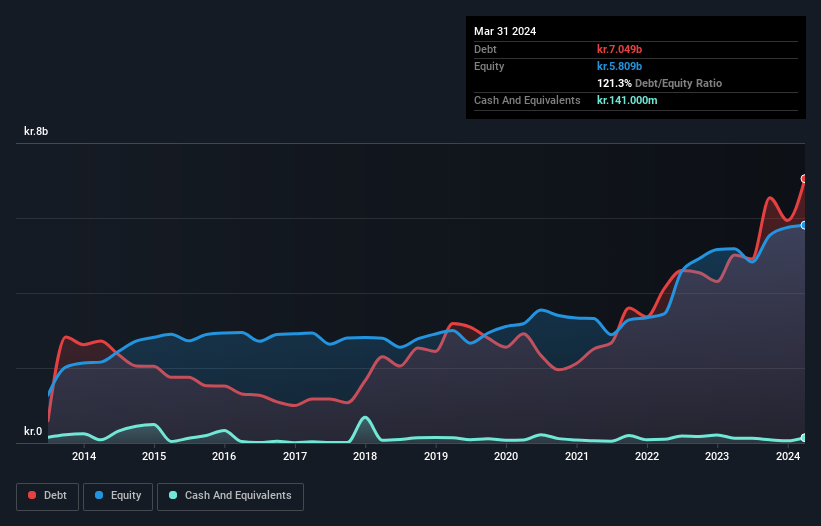Warren Buffett famously said, 'Volatility is far from synonymous with risk.' It's only natural to consider a company's balance sheet when you examine how risky it is, since debt is often involved when a business collapses. Importantly, Royal Unibrew A/S (CPH:RBREW) does carry debt. But should shareholders be worried about its use of debt?
Why Does Debt Bring Risk?
Debt is a tool to help businesses grow, but if a business is incapable of paying off its lenders, then it exists at their mercy. Ultimately, if the company can't fulfill its legal obligations to repay debt, shareholders could walk away with nothing. However, a more frequent (but still costly) occurrence is where a company must issue shares at bargain-basement prices, permanently diluting shareholders, just to shore up its balance sheet. Of course, plenty of companies use debt to fund growth, without any negative consequences. When we think about a company's use of debt, we first look at cash and debt together.
See our latest analysis for Royal Unibrew
What Is Royal Unibrew's Debt?
The image below, which you can click on for greater detail, shows that at March 2024 Royal Unibrew had debt of kr.7.05b, up from kr.5.02b in one year. However, because it has a cash reserve of kr.141.0m, its net debt is less, at about kr.6.91b.

A Look At Royal Unibrew's Liabilities
According to the last reported balance sheet, Royal Unibrew had liabilities of kr.5.68b due within 12 months, and liabilities of kr.6.72b due beyond 12 months. Offsetting this, it had kr.141.0m in cash and kr.2.28b in receivables that were due within 12 months. So its liabilities total kr.9.98b more than the combination of its cash and short-term receivables.
This deficit isn't so bad because Royal Unibrew is worth kr.27.5b, and thus could probably raise enough capital to shore up its balance sheet, if the need arose. But it's clear that we should definitely closely examine whether it can manage its debt without dilution.
We use two main ratios to inform us about debt levels relative to earnings. The first is net debt divided by earnings before interest, tax, depreciation, and amortization (EBITDA), while the second is how many times its earnings before interest and tax (EBIT) covers its interest expense (or its interest cover, for short). This way, we consider both the absolute quantum of the debt, as well as the interest rates paid on it.
Royal Unibrew has a debt to EBITDA ratio of 3.1 and its EBIT covered its interest expense 6.6 times. Taken together this implies that, while we wouldn't want to see debt levels rise, we think it can handle its current leverage. If Royal Unibrew can keep growing EBIT at last year's rate of 11% over the last year, then it will find its debt load easier to manage. When analysing debt levels, the balance sheet is the obvious place to start. But it is future earnings, more than anything, that will determine Royal Unibrew's ability to maintain a healthy balance sheet going forward. So if you're focused on the future you can check out this free report showing analyst profit forecasts.
Finally, while the tax-man may adore accounting profits, lenders only accept cold hard cash. So we clearly need to look at whether that EBIT is leading to corresponding free cash flow. During the last three years, Royal Unibrew produced sturdy free cash flow equating to 58% of its EBIT, about what we'd expect. This cold hard cash means it can reduce its debt when it wants to.
Our View
Both Royal Unibrew's ability to to grow its EBIT and its conversion of EBIT to free cash flow gave us comfort that it can handle its debt. On the other hand, its net debt to EBITDA makes us a little less comfortable about its debt. When we consider all the elements mentioned above, it seems to us that Royal Unibrew is managing its debt quite well. But a word of caution: we think debt levels are high enough to justify ongoing monitoring. The balance sheet is clearly the area to focus on when you are analysing debt. However, not all investment risk resides within the balance sheet - far from it. These risks can be hard to spot. Every company has them, and we've spotted 3 warning signs for Royal Unibrew you should know about.
When all is said and done, sometimes its easier to focus on companies that don't even need debt. Readers can access a list of growth stocks with zero net debt 100% free, right now.
New: AI Stock Screener & Alerts
Our new AI Stock Screener scans the market every day to uncover opportunities.
• Dividend Powerhouses (3%+ Yield)
• Undervalued Small Caps with Insider Buying
• High growth Tech and AI Companies
Or build your own from over 50 metrics.
Have feedback on this article? Concerned about the content? Get in touch with us directly. Alternatively, email editorial-team (at) simplywallst.com.
This article by Simply Wall St is general in nature. We provide commentary based on historical data and analyst forecasts only using an unbiased methodology and our articles are not intended to be financial advice. It does not constitute a recommendation to buy or sell any stock, and does not take account of your objectives, or your financial situation. We aim to bring you long-term focused analysis driven by fundamental data. Note that our analysis may not factor in the latest price-sensitive company announcements or qualitative material. Simply Wall St has no position in any stocks mentioned.
About CPSE:RBREW
Royal Unibrew
Provides beer, soft drinks, malt beverages, energy drinks, cider/ready to drink, juice, water, and wine and spirits.
Solid track record, good value and pays a dividend.
Similar Companies
Market Insights
Community Narratives



